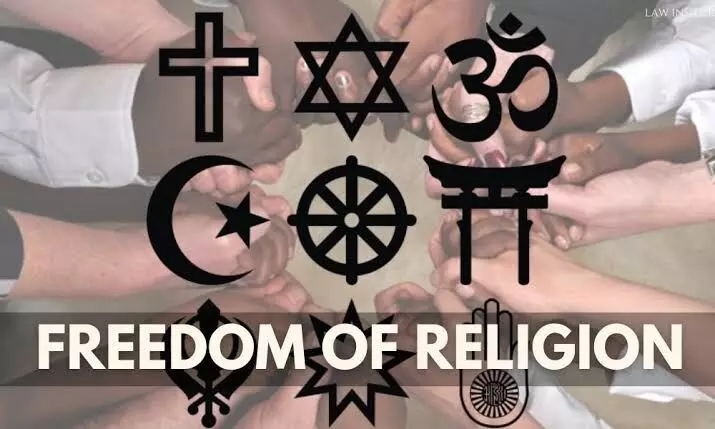One Country, Two Laws? The Unequal Application of Faith in Public Spaces

When senior Congress leader Digvijay Singh recently raised a pointed question—“One country, two laws?”—accompanied by two contrasting images of public religious practices, he didn’t just provoke outrage; he exposed a deep and growing fault line in India’s democracy: the unequal treatment of different religious communities in public life.
The first image showed the Kanwar Yatra—an annual Hindu pilgrimage where devotees often occupy entire highways—moving freely under state protection. The second showed Muslim worshippers offering namaz in a small public space, an act that has repeatedly drawn police action, public complaint, and in some cases, arrests. The question wasn't about ritual or devotion. It was about the law. And more precisely, whether the law is applied equally to all faiths in a secular republic.
The backlash from the ruling BJP was swift. Singh was accused of insulting Hindu traditions, engaging in “appeasement politics”, and hurting the sentiments of the majority. But lost in the political noise is the core of the issue: Is state machinery enabling one religious expression while actively policing another?
This isn’t a new pattern. Over the last decade, the selective application of administrative tolerance has increasingly tilted in favour of majoritarian religious activities. Road closures, loudspeakers, public processions, and encroachments—when connected to Hindu festivals—are often managed with accommodation or even state-sponsored enthusiasm. But similar expressions of other faiths are frequently met with legal restrictions, public hostility, or swift administrative action.
There is no denying that India’s religious festivals, across communities, disrupt public life to varying degrees. But what stands out is how the same state treats them differently. During the Kanwar Yatra, thousands of roads are blocked, public infrastructure is repurposed, and civic officials are deployed to manage and even facilitate the procession. In Uttar Pradesh and Uttarakhand, the police set up dedicated “Kanwar corridors”, and public announcements encourage participation.
Compare this to Eid prayers in public parks or Muslim congregational events like Muharram. These are frequently challenged on grounds of “public inconvenience”, leading to FIRs, cancellation of permissions, and public outcry amplified by media narratives that paint such events as violations.
In 2022, authorities in Gurugram (Haryana) revoked permission for public namaz in more than 30 locations after protests by right-wing groups.
Meanwhile, the same areas had no issue facilitating processions for Diwali or Holi, even when they blocked roads or created public noise. This isn’t a hypothetical contrast—it’s a pattern.
Data That Reveals the Pattern
Available data backs these concerns. A 2023 study by the Centre for Equity and Inclusion (CEI) found that:
• Over 70% of religious gatherings by minority communities faced permit delays or rejections in North Indian states.
• FIRs were filed against Muslim youth in 14 cities for offering namaz in open areas between 2021–2024, even when no violence occurred.
• In contrast, not a single FIR was registered against Kanwar Yatris in the same period—even when multiple instances of vandalism and public violence were recorded in Meerut, Ghaziabad, and Bareilly.
Another RTI response in 2024 revealed that states like Uttar Pradesh deployed more police for Kanwar management (over 25,000 officers in 2023) than for all non-Hindu religious festivals combined. This kind of resource allocation, while not illegal, reflects a policy preference that blurs the line between administration and faith.
The ruling party and its supporters argue that questioning Hindu religious events amounts to “hurting sentiments” or engaging in vote-bank politics. Digvijay Singh’s comment was labelled as “anti-Sanatan”, and some even called for legal action against him. But such reactions ignore the constitutional basis of his question. Raising concerns about equal treatment under law is not anti-faith. In fact, it's pro-Constitution.
The opposition—particularly the Congress, the Left, and regional parties like the Samajwadi Party and Trinamool Congress—have consistently argued that the idea of India as a secular nation demands impartiality from the state. The issue is not with any one festival or faith, but with how state machinery appears to privilege some expressions over others.
As one CPI(M) leader put it, “The question is not whether Kanwar Yatra should happen. It’s whether namaz in a park should trigger a police case while road blockades in the name of religion are celebrated.”
India’s challenge today lies in its shrinking neutrality of public spaces. When one group’s devotional act becomes a state event and another’s becomes a law-and-order issue, secularism suffers—not as a slogan but as a lived principle. The Constitution, through Articles 25 to 28, guarantees freedom of religion—but not the freedom of selective enforcement.
The issue also has implications for social harmony.
When citizens perceive the law to be biased, resentment grows. It creates the very divisions the Constitution aimed to erase. Today, when citizens of different faiths experience governance differently, it isn't just a social failure—it’s a legal and ethical one.
Digvijay Singh’s tweet is not the problem—it is a symptom of a deeper disease: the politicisation of faith and the hollowing out of constitutional values. The conversation it has sparked is not merely about roads or rituals, but about whether India is still committed to equality before the law.
The responsibility lies with all political actors—not just the ruling party—to ensure that religious practices, regardless of community, are treated with fairness, dignity, and legality. Otherwise, the question of “One country, two laws?” will echo far beyond this controversy—becoming a permanent fracture in India’s secular promise.
